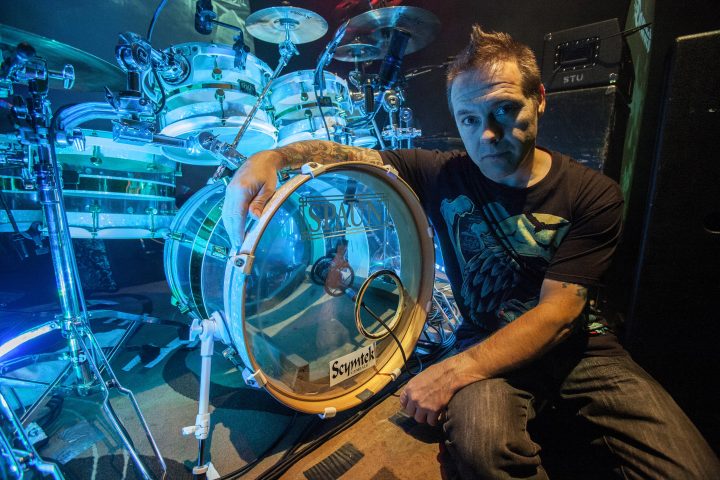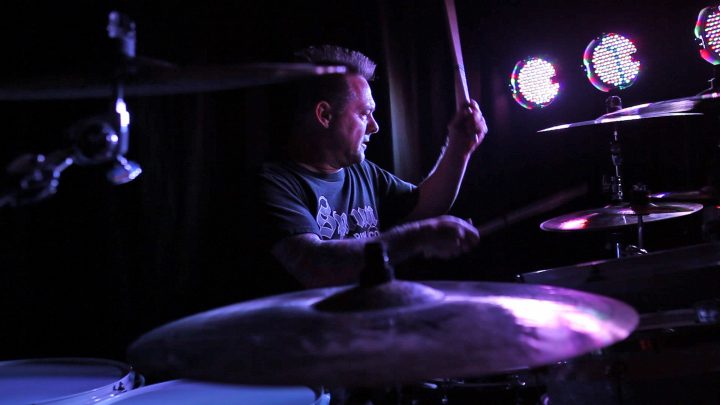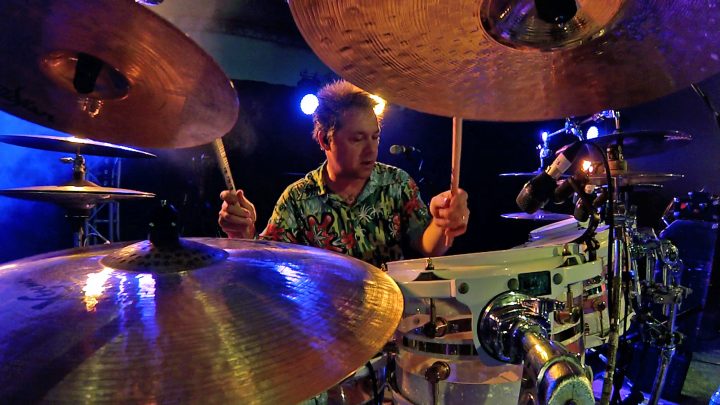The Damned’s Pinch

When you follow a drummer like Rat Scabies into a band, as Andrew “Pinch” Pinching of British punk institution the Damned did, it’s easy to figure that to some extent, you’re always going to be viewed as “the new guy.” In actual fact, Pinch followed two short-term interim drummers who had the unenviable role onstage of replacing Scabies, whose blistering performances on classic Damned cuts like “Neat Neat Neat,” “Love Song,” and “New Rose” make him a favorite among fans of first-wave British punk to this day. Neither drummer got a chance to appear on a studio album by the Damned, though, and by the time 2001’s Grave Disorder came out, Pinch was already well-ensconced in the Damned’s wild world. And it’s Pinch, who came to the group from the seminal Grantham, England, band the English Dogs, who’s still with the Damned, which is currently touring the United Kingdom.
Earlier this year the illuminating rock-doc Don’t You Wish That We Were Dead, directed by Wes Orshoski (Lemmy), hit the shelves, making it as good a time as ever to catch up with the man responsible for keeping the notoriously uncontainable band locked in. Modern Drummer editorial director and longtime Damned fan Adam Budofsky recently asked the drummer about his background and what it’s been like playing in this unique, still incendiary group.
MD: When and where did you start playing the drums?
Pinch: I started playing at fifteen, in 1980, after giving up a promising amateur boxing career in the East Midlands of England. Judges back then were just not ready for Mohawks in the ring, so I started my first band, English Dogs, to work out that cardio, aggression, and rhythm I had drilled into me. Hardcore punk was definitely the choice of music for ex-boxers! Advertisement
My first kit was a white marine pearl Premier Olympic five-piece with Zyn cymbals that my parents bought me for sixty pounds U.K.
MD: Do you think your drumming has changed over the years in any particular ways?
Pinch: I never had a lesson—although I wish I had—and my playing developed from watching other drummers at shows back in the day, when you could literally park yourself level onstage with the drummer if you were brazen enough. I could actually see how these guys pulled off a lot of their tricks, a pretty eye-opening way to learn.
I would say the biggest improvement in my technique has been posture and wrists. It has perhaps saved me from a lot of drumming-related injuries that other kids may run into, but also serves as important notice to at least get basic lessons on grip and position. That, and time—really the most important aspect to lock down. Playing with click tracks to many different styles helps you actually loosen up and become comfortable in your own particular pocket. When you don’t hear the click whilst recording, you know you are really on it.
MD: Neither the English Dogs nor the band that grew out of it, Janus Stark, fit neatly into any one style category. With 20/20 hindsight, bands like that, who had both punk and metal elements to them, were doing stuff that is taken for granted today. Did it seem unusual to audiences in the ’80s, or did they take you at face value? Advertisement
Pinch: It was rough back then, both physically at the shows and trying to get blinkered punks to open up and accept anything but a D-beat [a punk beat associated with the early British punk band Discharge]. We all loved Discharge, and I personally owe GBH a huge debt of influence, but I also loved Iron Maiden, Sabbath, Rush, and most other NWOBHM stuff. I was a big fan of Tommy Aldridge playing for Ozzy, Clive Burr in early Iron Maiden, and Wilf [Andy Williams] from GBH.
My grandad was in big bands during and after WWII and would play me some great old 78s with amazing drummers, so I was picking it up all over the place. I always thought the first rule of punk was that there were no rules, so it was tough getting criticized for playing outside of the box. Thankfully everything changed when Metallica and Slayer kicked down the doors that Motörhead had cracked open.
MD: The Damned have been impossible to categorize from pretty much the beginning—though that doesn’t make the fact that Rolling Stone magazine recently left the band off a list of the top punk albums any easier to fathom. Are you and the other members ever bothered by this sort of thing, or is it just us fans being overprotective? Advertisement
Pinch: I don’t think anyone is impressed when history is rewritten to suit one person’s point of view, but ultimately, the Damned know what they achieved. They were instrumental in changing the course of musical and cultural direction. Ask any musician over the age of thirty-five how influential the Damned are. Perhaps the most important legacy has been to influence the influencers.
MD: You mentioned in an interview that Damned songs aren’t as fast as one might imagine. That’s an interesting lesson, and to me speaks of the energy of the band being so high that it kind of gives the illusion that everything is super fast. Were there any other things about the Damned’s music that surprised you once you started playing with them?

Pinch: I really cut my teeth on hardcore punk and metal, so coming to the Damned, it was actually a lot more laid back than I imagined, having never played a Damned song before I auditioned. If you put a metronome to recorded Damned tracks, particularly from the Chaos [early] years, you will find the tempos not being anywhere near what you think them to be. Rat played a lot of fairly brisk single-stroke fills around the kit, and perhaps that made everything appear to be faster than it actually was. I found myself having to throttle back a lot, especially after listening to live shows I’d played in the early part of my Damned career. There is a certain groove that Rat achieves, a lot of it by just having a very simple kick drum pattern, some of it by the seat-of-his-pants, speed-fuelled energy of youth, but all of it a lot slower than it ever felt as a listener. That’s kind of a neat trick when you can fool ears into imagined tempo. Advertisement
MD: What was it like initially when you joined the band in terms of being Rat’s replacement, and have the fans come around to giving you your due respect?
Pinch: Between Rat and me there were two other drummers in a short period of time, Garrie Dreadful—apparently a great guy, but I wasn’t a huge fan of his feel on the songs—and Spike T. Smith, who set me up for the audition after joining Morrissey briefly. Spike is a great player and friend who actually replaced me in English Dogs in the late ’80s. Ultimately, in the eyes of some fans, we are all Rat’s replacements and they will never get over the fact that their hero, for whatever reason, hasn’t been on that throne for twenty years. I spoke with Mikkey Dee about this when we toured with Motörhead, as we are in similar situations. His advice was just to do the best you can to invoke why those fans loved the band in the first place. I always felt that was my mission when I came into this, to put some fire back in the belly now that they were hungry again. I have a great relationship with the fans that know me, and I’m super grateful for their support. All I can do is put my all into every show and send you home with a smile on your face.
MD: You’re a fantastic drummer in your own right, as anyone who’s followed English Dogs and Janus Stark knows. I’m curious what you think your best traits as a drummer are. And what about outside the music?
Pinch: Ha! Thanks for checking out my playing on other stuff where I have a perhaps “freer hand” in what makes it to the final cut. Clicking with other musicians is an amazing feeling, seldom achieved even once in a lifetime, but I am lucky to have connected to several people I’ve played and recorded with. Perhaps the best trait of any drummer is being able to do just that, click. Advertisement
Outside of playing, I work with a diverse range of bands all over America in a production capacity, so I get to see band life from both sides of the fence. An interesting paradox.
MD: To me, “Democracy,” the opening track of the 2001 album Grave Disorder, is primo Damned—the energy, the accents on the drums/guitar riff. And you get some fun licks in there. Your playing on “Danger to Yourself” from 2008’s So, Who’s Paranoid? is another favorite. Also, the beginning of “Thrill Kill” from Grave Disorder catches me by surprise every time—I always mess up where the 1 is. That seems like a quintessential Damned thing. What was it like recording with the group for you at first? Did it click immediately?
Pinch: I think my playing the back catalogue, once I had slowed down a little from hardcore punk tempo, really wasn’t a problem. I had to incorporate all the signature Scabies fills, it was what was expected. Recording, on the other hand, was a different process. Having been a Rat fan growing up, I was ready to wildly flail all over the songs, but was reined in by the combination of a band that wanted a more refined approach and a Grammy award–winning producer [David Bianco] who would allow no such behavior.
I learned very quickly that the Damned are not punk by numbers in any way, and you really have to bring your A-game to every show. A typical Damned set will comprise equal parts punk, garage, psychedelia, and jazz. I kid you not. Literally hundreds of shows with the Damned in my first few years taught me a lot about the peaks and troughs of playing, and how they can work in perfect harmony. Playing aggressively is so much easier than playing tastefully. Advertisement
MD: I was listening to the English Dogs’ Forward Into Battle the other day, and was loving that section of “Ultimate Sacrifice” near the end where the drums kind of take over. Do you recall much about cool moments like that in the studio? What are some of your fondest recording memories from over the years with that band and Janus Stark?
Pinch: They were very different projects in that English Dogs had absolutely no rules or boundaries and Janus Stark was a lot more controlled. Sometimes the no-rules approach can be fun and exciting, but it can also lead to overindulgence with nobody to rein you in. On the flip side, recording with Janus Stark felt like a guided session, where ultimately you were creating what a producer felt a drum track should be. As a pro drummer, you have to be able to get the job done in whatever way works for the project, no matter how you feel your playing should be. Recording [English Dogs’ 1998 album] All the World’s a Rage with Andy Sneap was an extremely intense experience. Once that red light went on, it was like a hundred-meter sprint to the finish, and you had better be able to fit in all your fills at the correct tempo, often upward of 200 bpm. I learned a lot about stamina and pacing your session on that record.
MD: “Ordeal by Fire,” from Forward Into Battle, is a pretty rare thing, a punk song with sections in three. It reminds me in a way of the Damned’s Black Album, in that it’s more ambitious structurally than people normally give punk records credit for being. Were the rhythmic transitions in that song tough to nail? Any other particularly tough songs that you can recall recording over the years? Advertisement

Pinch: The feel on “Ordeal by Fire” has what we jokingly referred to as the Beast Galloping Over the Hill rhythm. Visions of armies of battle stallions and armored maniacs. We used to throw that in quite a lot as it’s a great double-kick drum feel. Even though that record was quite technical, we went full blown on the next one, Where Legend Began.
Recording that album was a real struggle. Time changes and snippets of odd sections all over the place in every song, just because we thought we could play them, so they should go in. The sound of that record is a bunch of kids struggling to find their feet in a world they had no business being in. All that technical stuff really killed the flow of the songs, and we had nobody to tell us when we had jumped the shark. I don’t think [record label] Music For Nations really knew what to do with what we presented them with. The world wasn’t yet ready for what we created back in the ’80s.
MD: Have you gotten a chance to see Don’t You Wish That We Were Dead yet? For me it’s such an important thing to have out there; people in general don’t know enough about the band. What are your feelings on it? Advertisement
Pinch: I was at the world premiere in Austin last year. An interesting experience. DV [Damned singer Dave Vanian] stayed in the hotel room and asked us to tell everyone that he couldn’t attend as he was dead, and [guitarist] Captain [Sensible] spent the parts of the movie that he didn’t like offering people candy and nuts in extremely loud plastic bags whilst shouting at the screen to cover up dialogue. I love Wes for attempting to capture the chaos of this band’s career, but as he found out, it’s far from an easy story to tell. Because of the nature of the band’s existence, there are always going to be separate camps faithful to whatever lineup or record, and the movie was never going to please them all. I think a mini-series would have struggled to capture all the plot twists, so a ninety-minute movie had no chance.
MD: Finally, what’s on the calendar for you this year? Recording, touring?
Pinch: Throughout the summer we’re playing the usual round of festivals here and there, all leading up to a much longer jaunt around the planet late this year and early next. Recording wise, it’s really is up to Mr. Vanian and Sensible when they deem the time right to get back in the studio. We learned from So Who’s Paranoid? that without those two conspiring willingly, there is no point. They really are the Lennon and McCartney of punk, and at least one of them will hate me for saying that.
Tools of the Trade
Pinch plays a Spaun Acrylic/Maple Hybrid kit that features 8×8, 8×10, and 8×12 toms, 11×14 and 11×16 floor toms, and a 20×20 bass drum; his snare is a Spaun Damned 35th Anniversary 7×14 maple model. Pinch’s Scymtek cymbal selection includes 14″ hi-hats, 17″, 18″, 19″, and 20″ Xtreme crashes, a 21″ Xtreme ride, a 17″ Vented crash, an 18″ Xtreme China, and 6″ and 8″ Modern splashes. His hardware is from Pearl’s 2000 series, and his double bass drum pedal is a Pearl Eliminator. Pinch’s Evans heads include G1 Coated tom batters and G1 Clear resonants, an HD Dry snare batter, and an EMAD bass drum batter. He uses Promark American Hickory TX5BW sticks. Advertisement
Photos by Wes Orshoski.


